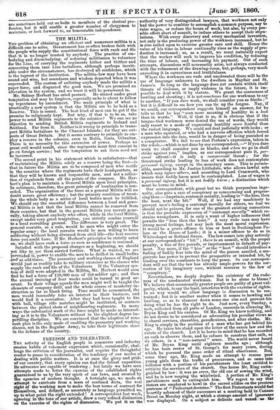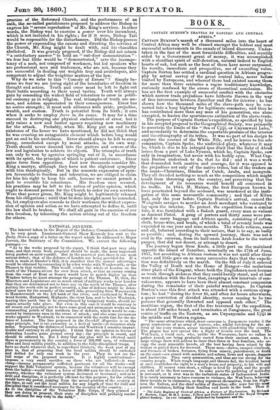FREEDOM AND TOLERATION. authority of very distinguished lawyers, that workmen
not only had the power to combine to accomplish a common purpose, say to raise wages, or reduce the hours of work, but also, by every pos- sible effort short of assault, to induce others to accept their stipu- lations. With every discovery and every mechanical invention, not only is the producing power of the workmen increased, but he is also called upon to exercise greater care and skill. Hence the value of his time in labour continually rises as the supply of pro- duction is increased ; so, as a result, we must naturally expect that the worker will seek to improve his condition, by reducing the time of labour, and increasing his payment. Out of such attempts, discussions will necessarily arise, not always conducted with the refinement of the drawing-room, but, perhaps, very much exceeding it in earnestness and truthfulness.
Where the workmen are rude and uneducated there will be the use of language unknown to the dwellers in Mayfair and St. James's. So long as the language does not contain within itself threats of violence, or imply violence in the future, it is im- possible to deal with it by statute. We grant the coarseness of howling and shouting ; it is not courteous for one workman to say to another, " If you dare work, we shall consider you as blacks ;" but it is difficult to see how you can tie up the tongue. Nay, if we could, our correspondent suggests himself an answer, for he tells us that he has seen more meaning of hostility in a look than in words." Well, if that is so, it is obvious that if the tongue-tied workmen were denied the use of words, they would only resort to a mode of expressing hostility more fearful than the rudest language. We could not deal judicially with looks ; or a man who squinted, or who had a nervous affection which forced expression into the face, would be in danger of being punished as a conspirator. We fail to see that Perham's expression, taken in the whole,—which is not done by our correspondent,—" If you dare work we shall consider you as blacks, and when we go in shall strike against you," implies, as our correspondent puts it, per- sonal affront—it is only a commercial threat ; for the threatened strike leading to loss of work does not contemplate personal injury, except in the monetary sense. This is permis- sible, according to Mr. Justice Littledale, who allows lawful sots which may injure others, and according to Lord Cranworth, who insists that bodily harm must be contemplated. Loss of wages is a personal injury, but it is not bodily harm ; a distinction which must be borne in mind.
Our correspondent, with great but we think purposeless inge- nuity, also puts a case of conspiracy as commencing and progres- sing thus :—Imprimis, contempt morally, leading to " the hiss, then the hoot, next the hit." Well, if we had any machinery to prevent men's feeling a contempt morally for others, we fear we should not be gainers, for one of the greatest existing correctives is that the probable expression of " contempt morally" which re- strains wrongdoers. It is only a want of higher influences that permits the "hiss then the hoot." A very rude man may have strong moral feelings, but may lack the most moral expression. It would be a grave offence to hiss or hoot in Buckingham Pa- lace or the House of Lords ; it is a minor offence to do so in Whiteohapel or Bethnal Green. The law comes into play actively at our correspondent's " hit" ; there is an assault, with the proper penalty, a fine of five pounds, or imprisonment in default of pay- ment. Nay more, if the " hiss" or the " hoot " should introduce a feeling of bodily fear into the mind of the person assailed, a ma- gistrate has power to prevent the prospective or intended hit, by binding over the assailants to keep the peace. So our correspon- dent will see that the law has already ample powers for the cor- rection of his imaginary case, without recourse to the law of " conspiracy."
Nevertheless, we deeply deplore the existence of the rude- ness of the uneducated workman. But is he alone to blame We believe that occasionally greater people are guilty of great vul- garity, which, to say the least, interferes with the exercise of rights. In no way would we allow language in discussion to be res- trained ; but it is another matter when it comes to howling and bawling, so as to clamour down some one else and prevent his doing what he has the right to do. Just now, every Sunday, a mob, collected from all parts of London, succeeds in silencing Mr. Bryan King and his curates. Of Mr. iing we know nothing, and do not desire to be considered as advocating his peculiar views as to choral services, chasubles, genuflexions, and altar cloths. Mr. King is simply in the position of a man who has got behind his age. He takes his stand upon the letter of the canon law and the rubric of the church. Let it be borne in mind that he has recorded an. oath to observe them, and he refuses to construe that oath, as do others, in a " non-natural " sense. The world never heard of Mr. Bryan King until eighteen months ago ; although he has been rector of St. George's for many years, during which he pursued the same order of ritual observance. But, some time ago, Mr. King made an attempt to rescue poor young girls from the traffic of procuresses, and so came into collision with a portion of his parishioners the least entitled to criticize the services of the church. One house Mr. King extin- guished by law : it was an error, the old one of sowing the wind, and he is now reaping the whirlwind. Iportion of Mr. King's parishioners seek to extinguish him. We regret to say that rioters are employed to howl in the sacred edifice on the precious pretence of " Protestant doctrine." The first Protestants would feel heartily ashamed of their successors at a meeting held in Cannon Street on Monday night, at which a strange amount- of ignorance was displayed. On a subject so delicate and vexed as the practice of the Reformed Church, and the performance of an oath, the so-called parishioners proposed to address the Bishop to express his " severe reprobation" of Mr. King's services. In other words, the Bishop was to exercise a power over his incumbent, _which is not included in his rights ; for if it were, Bishop Tait would be responsible for the disturbances. Did the Bishop possess the power of expounding the canons and directing the services of the Church, Mr. King might be dealt with, and his chasubles abolished. It was gravely proposed, if the Bishop did not return "a satisfactory answer " to hold an " out-door demonstration" : we fear but little would be " demonstrated," save the incompe- tency of a mob, not composed of workmen, but led speakers who are professional men and tradesmen, who are not, because they are successful in dealing out weights troy and avoirdupois, also competent to adjust the weightier matters of the law. Why do we refer to this " Comedy of Errors" ? Simply be- cause we fear we are losing sight of the boundaries of freedom in thought and action. Truth and error must be left to fight out their battle according to their usual tactics. Truth will always gain by conceding the widest field of toleration to error in politi- cal economy as in religion. The real triumphs of truth are un- seen, and seldom appreciated in their consequences. Error has no native strength ; it must seek alliances with pride, prejudice, wealth, and custom. Troth is potential from its birth ; it errs when it seeks to employ force in its cause. It may for a time succeed in destroying one physical embodiment of error, but it only raises a new and lustier agency requiring new machinery for the attack. Probably, when Mr. King put an end to the existence of the house we have mentioned, he did not think that he was creating an antagonistic element which before long would. put an end to his usefulness. Error should always be left to creep along, unmolested except by moral attacks, in its own way. Truth should never descend into the gutters and sewers of the law and legislation to achieve its objects. The triumphs of truth can only be won by agencies springing out of it, in accordance with its spirit, the principle of which is patient endurance. Error gains force from opposition. Just now thousands consider Mr. King a martyr, although they have not the slightest sympathy with him theologically. But in the concrete expression of opin- ion favourable to freedom and toleration, we are obliged to claim for him his right to keep his oath, because we cannot permit a mob to override his conscience. His freedom once secured, his practices may be left to the action of public opinion, which ought to demand powers for the Church to order its own services. Were that power given, Mr. King might be legitimately released from his obligations ; until that be done his right must be conceded. So, let employers also concede to their workmen the widest expres- sion of opinion and action as we have attempted to define it, until the law shall be broken. We shall all gain in the exercise of our own freedom, by tolerating the action arising out of the freedom for others.



























 Previous page
Previous page